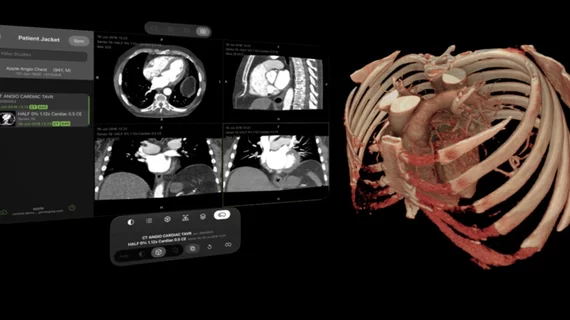Apple Vision Pro app brings augmented reality to radiology
Apple’s latest consumer gadget, the Apple Vision Pro—a “spatial computing” headset that effectively allows users to augment reality with a heads-up display—sold hundreds of thousands of units before it even launched. While developers are still devising uses for the goggles, one company has launched an application to interact with medical images—and it’s already being used by UC San Diego Health.
The Visage Ease VP app provides an immersive experience for the viewing of radiology images, allowing the operator to interact with them in high resolution for improved diagnostics, or to plan strategies for patient care. Images can be interacted with using eye motions, hand movements, and voice commands to zoom in and gather extra details on report findings, all of which can be viewed in a 4K rendering.
"The visualization of three-dimensional medical imaging in immersive space creates exciting opportunities to improve patient care," Paul Murphy, MD, a radiologist at UC San Diego Health, said in a statement. "Technology that allows for sophisticated eye motion and gesture controls for reviewing 2D and 3D medical imaging could potentially help in efficient tumor board reviews and create collaborative spaces in healthcare."
UC San Diego Health piloted use of the app, which requires healthcare organizations to have access to the Visage enterprise imaging platform. Visage Ease also links with the hospital EHR, effectively operating like a traditional image viewer application one may find on a handheld smart device. All modalities are supported and can be viewed in augmented reality.
It is now available for download on the Apple digital storefront.

